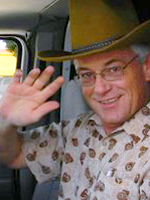Inside look at a bizarre election
Leon Worden · February 26, 1997
SACRAMENTO -- Joe Shumate didn't know what to think when his
office phone rang last February. It was the most important election of the 1996 season, and
the outlook was grim.
The voice on the phone sought high-caliber advisers, and Shumate fit the bill. For years
Shumate had called the shots for Republican candidates up and down California, including
some locally, such as former Assembly candidate and Valencia attorney Hunt Braly.
Shumate phoned George Gorton, Gov. Pete Wilson's top strategist. Gorton had recently
pulled the plug on Wilson's ill-fated White House bid and could use a new client right about
now. "What should we charge (to do this campaign)?" Gorton asked Shumate.
"I don't know," came an uneasy chuckle. The candidate was polling fifth with a
meager 6 percent approval rating. "Let's see. It's the first free election in 800 years, it's
the largest land mass in the world...."
The candidate was Boris Yeltsin.
Shumate and Gorton arrived in Moscow in February, 1996 with Dick Dresdner, another
former Wilson consultant who, with partner Dick Morris, once ran the gubernatorial
campaigns of Arkansas Gov. Bill Clinton. They had four months to save Russian president
Yeltsin's political skin and, in so doing, thwart the former Soviet republic's likely backslide
to communism in the form of Gennadi Zyuganov, who was leading.
"No one could know we were there," Shumate said Saturday. "The idea of
bringing in Americans to revive Boris Yeltsin would have been an incredible tool for the
communists."
"We never even met Yeltsin," Gorton adds. "No one meets with Yeltsin. We
dealt with Tatiana (Dyachenko, Yeltsin's daughter), and that gave her enormous
power." Only Dyachenko meets daily with Yeltsin, to whom she filters information,
Gorton explains.
"The intrigue was incredible. Our phones were probably bugged by three different
organizations." "The murder rate in Russia is two times higher than in New York
City. In New York, most murder victims are drug dealers. In Russia, number one are
bankers, number two are bureaucrats, number three are politicians. And hey, that's
us!"
"The KGB didn't go away, it just changed its nameplate. They were far more interested
in what Mr. Shumate was doing than if there were U.S. subs off the coast. If the
communists took over, (the secret police) would all be shot, so they wanted to know what
Joe was doing about the election."
What the Americans did was develop the same sort of strategy they've used here countless
times: polling, focus groups, and negative advertising. They polled twice a week and
assembled 50 focus groups to gauge voter opinions. Most people believed Yeltsin corrupt
and blamed him for the unpopular war in Chechnya. Even Josef Stalin polled higher than
Yeltsin in the countryside.
"We kept sending memos to Yeltsin, telling him to give land to the peasants,"
Gorton says. "Finally he signed the decree. It was the first time since 1917 that Russia
had private land ownership." But the strategy backfired. Yeltsin's numbers dropped
farther. "The perception was that Moscow was the Emerald City, and now with
privatization, the checks stopped coming."
The team regrouped. Yeltsin should get out among the public, shaking hands and planting
trees. But Yeltsin insiders "were freaked out about the idea of him going out among
the public because they didn't want him getting booed," Shumate says.
Enter Bill Clinton. With the two presidents meeting in April for a Moscow summit, Dresdner
called Dick Morris. "We got Clinton to downplay Chechnya," Gorton says. Clinton
let Yeltsin look tough and encouraged him to appear in his own commercials.
The conversation officially never took place. But within a few days, Yeltsin was touring
"three or four different geographical regions on a two-day swing," Shumate says.
The team stitched together footage of the isolated and stodgy Russian leader appearing to
be what he was not -- a warm and friendly man of the people. Yeltsin pulled even but just
couldn't take the lead. Television had always been a tool for state-sponsored lies, and the
public wouldn't buy Yeltsin's promises.
Only one trick remained in the Americans' arsenal. Negative campaigning. Yeltsin's forces
balked. The advisers persisted.
"About half the country believed there would be civil war if the communists took
over," Gorton says. Nonetheless, says Shumate, "it was tough to convince
(Yeltsin's people) to go hard anti-communist. They wanted to go against the other
democrats, and we had to convince them it would bring down all democrats" including
Yeltsin.
Yeltsin finally took the advice and let the Californians go negative. On first-round election
day, June 16, Yeltsin edged Zyuganov by 3 percentage points.
Shumate and crew turned up the heat. One ad featured a film clip of a 1930s-era Stalinist
execution with a voice saying, "No one thought in 1917 that sons would be killing
fathers...." TV viewers were barraged for two solid weeks.
Yeltsin took the runoff. The Americans hightailed it for home. And if you ask anyone in
the Kremlin, they were never there.
Leon Worden is a Santa Clarita resident. His commentary appears on Wednesdays.
©1997 LEON WORDEN — ALL RIGHTS RESERVED

